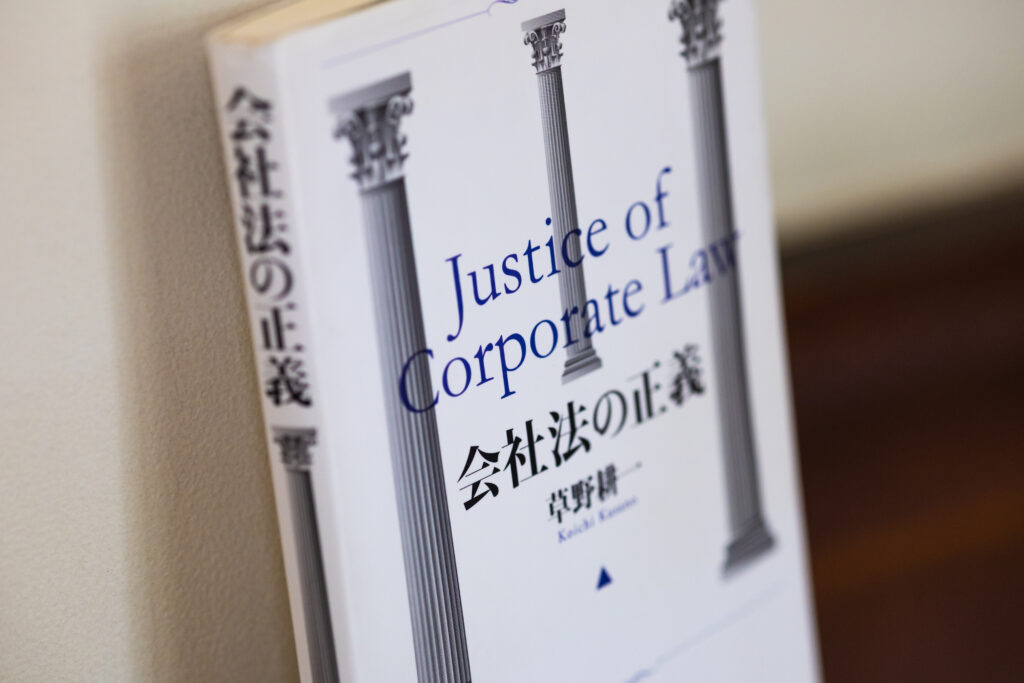
Professor Ryo Tsuchida of the Graduate School of Law, who studies corporate governance with a focus on commercial law, corporate law, and shareholder litigation, addresses the question: What kind of corporate governance is required in the SDG era? He discusses the importance of research that leads to the answer to that question.
My research into corporate governance began in 2014 when I became an outside director of Resona Bank and began work on responsible investment. Responsible investment is an approach in which investors incorporate ESG factors—Environment, Social, and Governance—into their investment process.
In the past, investors have analyzed companies primarily based on financial information, such as business performance. However, as awareness of issues such as climate change and human rights grows around the world, there is a growing recognition that a company’s active engagement in ESG issues is also essential for its long-term growth.
The ongoing challenge of guiding corporate management

When making responsible investments, companies will focus on how well these investments honor the Sustainable Development Goals (SDGs). While the goal of a company is to operate efficiently in order to maximize profits, the SDGs, such as addressing climate change and respecting human rights, are directly related to costs, which in some ways hinder the company’s “efficient management,” thereby creating a conflict.
In my research, I am trying to find the connection between corporate governance theory and the SDGs, and to pursue and demonstrate to companies a governance system that enables managers to achieve sustainable management.
In the process of presenting sustainable management, there are many criticisms leveled towards the conventional way of thinking. The reason being that in proposing how to become a sustainable company, we accept that external costs related to the environment, diversity, etc., which were not previously calculated, are now included in the management of the company.
However, the question of whether these costs should be borne by a company or by society as a whole is not a question that can be answered by a single company, but is deeply related to the social system itself. The key theme of my research is how we can offer a vision for the future of corporate governance together with society.
Introducing sampo yoshi as a key concept for sustainable management.
While many Japanese companies are cautious about the SDGs, a look at global trends shows that Western companies are generally more proactive. This is not because of strict laws and regulations, but because they see the SDGs as a business opportunity.
For example, in the financial world, companies can be classified into two categories: brown companies that use fossil fuels and green companies that manage their businesses with decarbonized resources. It is believed that this is due to lending rates being set higher for brown companies and lower for green companies. Thus, they are trying to make it easier to attract investment in companies that contribute to the sustainability of society, which includes the environment.
In the sluggish Japanese economy, the limitations of Japanese-style management have been pointed out, but in the age of the SDGs, the merits of Japanese-style management will become more pronounced.
While shareholders take priority in management that emphasizes profit maximization, sustainable management is based on a multi-stakeholder approach in which not only shareholders and management but also employees, consumers, local communities, and various other stakeholders collaborate to solve issues.
This is the key concept of corporate governance in the SDG era, which is consistent with the sampo yoshi (three-way satisfaction) concept of Japanese-style management—good for the seller, good for the buyer, and good for the world.
In corporate management in the SDG era, it will be deemed excellent management to accept costs reasonably and to properly distribute profits to those areas that generate added value. I would like to pursue corporate governance that is suited to the present times and leads management in a better direction.
The book I recommend
“Kaishaho no Seigi”(Justice of Corporate Law)
by Koichi Kusano, Shojihomu

This is the first and apex book that uses actuarial law, the mathematical analysis of law, to explain corporate law issues in an easy-to-understand manner. The book is very helpful in considering the validity of various arguments, as it presents the concept of making decisions based not only on logic, but also on the consequences of actions taken.
-
Ryo Tsuchida
- Professor
Graduate School of Law
- Professor
-
Graduated from the Faculty of Law, Sophia University, and completed doctoral coursework in the Graduate School of Law, Sophia University, Tokyo. He holds an M.A. in Law. After serving as a senior lecturer and associate professor at the Faculty of Law, University of East Asia, associate professor at the Faculty of Law, Meijo University, associate professor and professor at Omiya Law School, and professor at the School of Law, Senshu University, he has been in his current position since 2020. He is an attorney at the Law Firm of Frontier Law.
- Graduate School of Law
Interviewed: July 2022